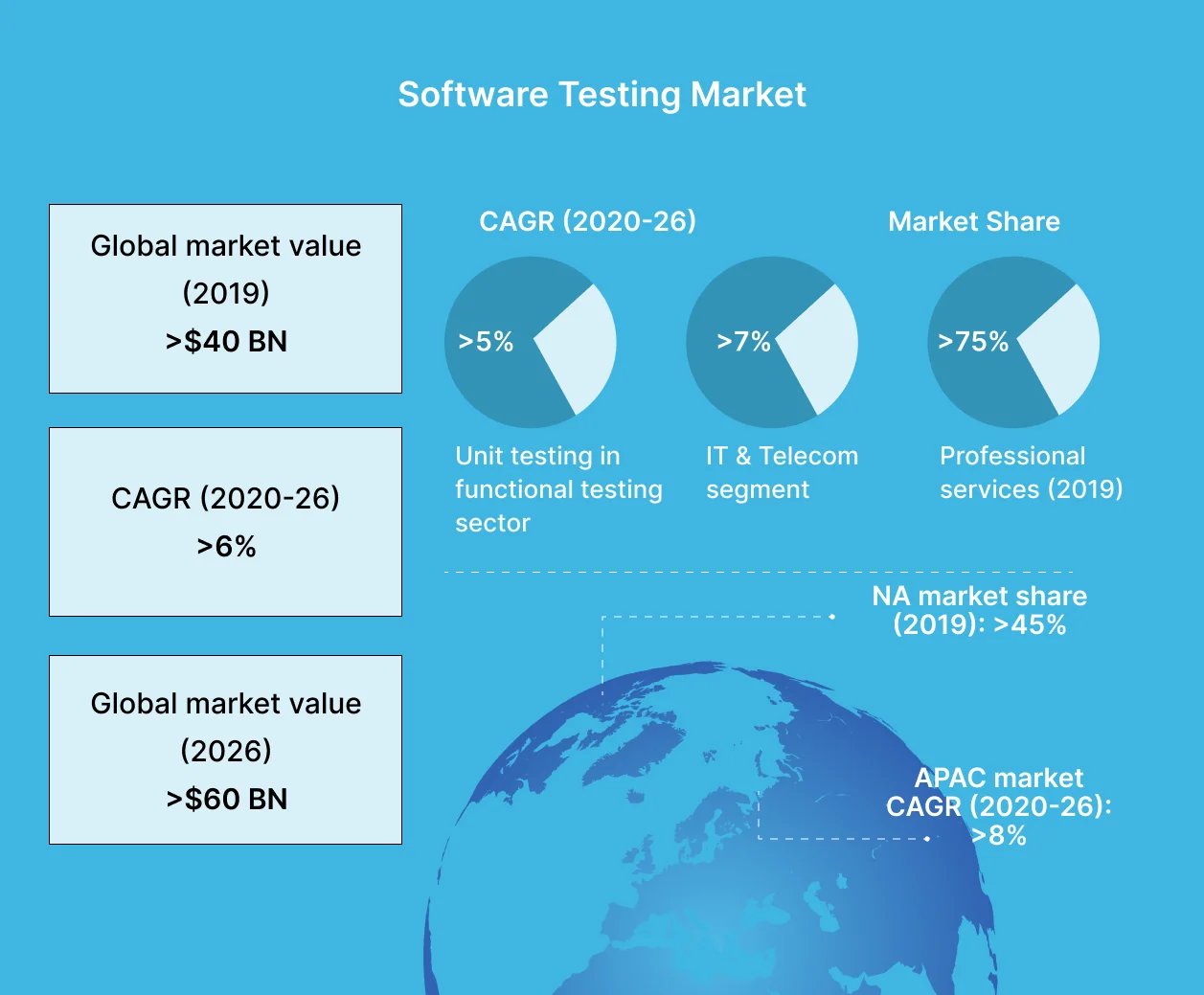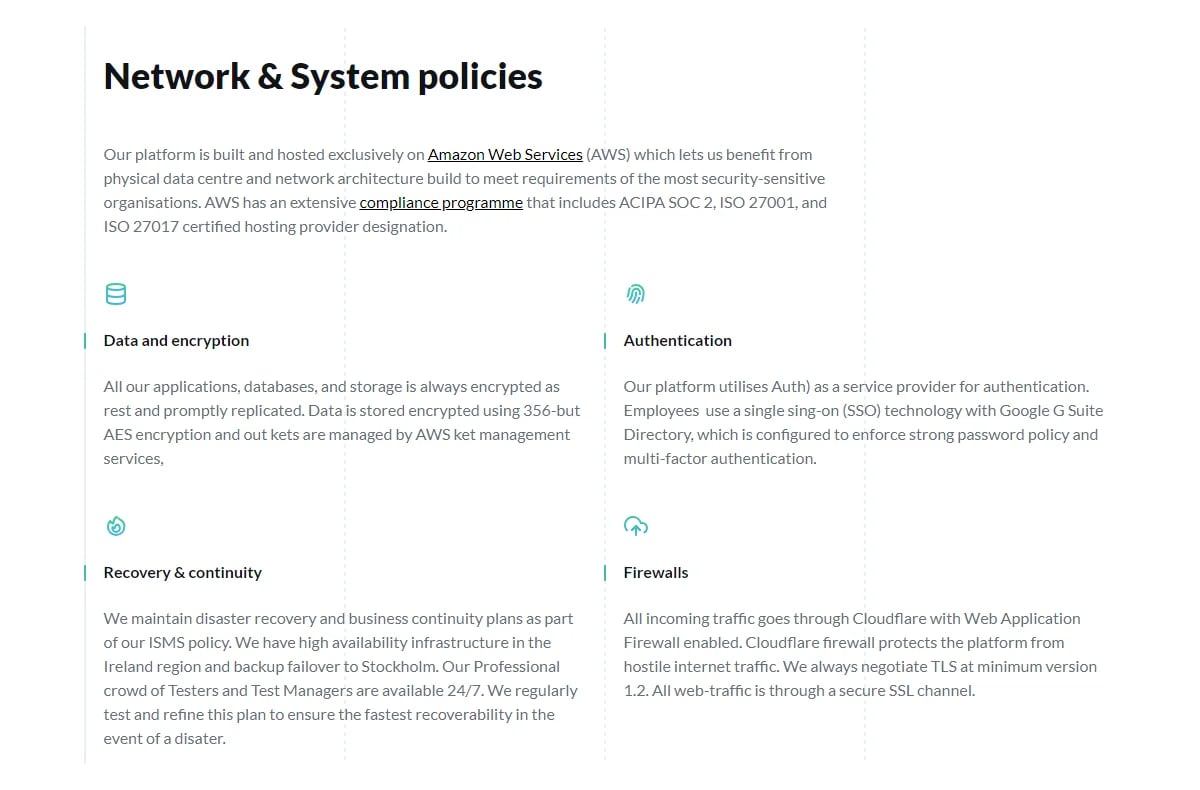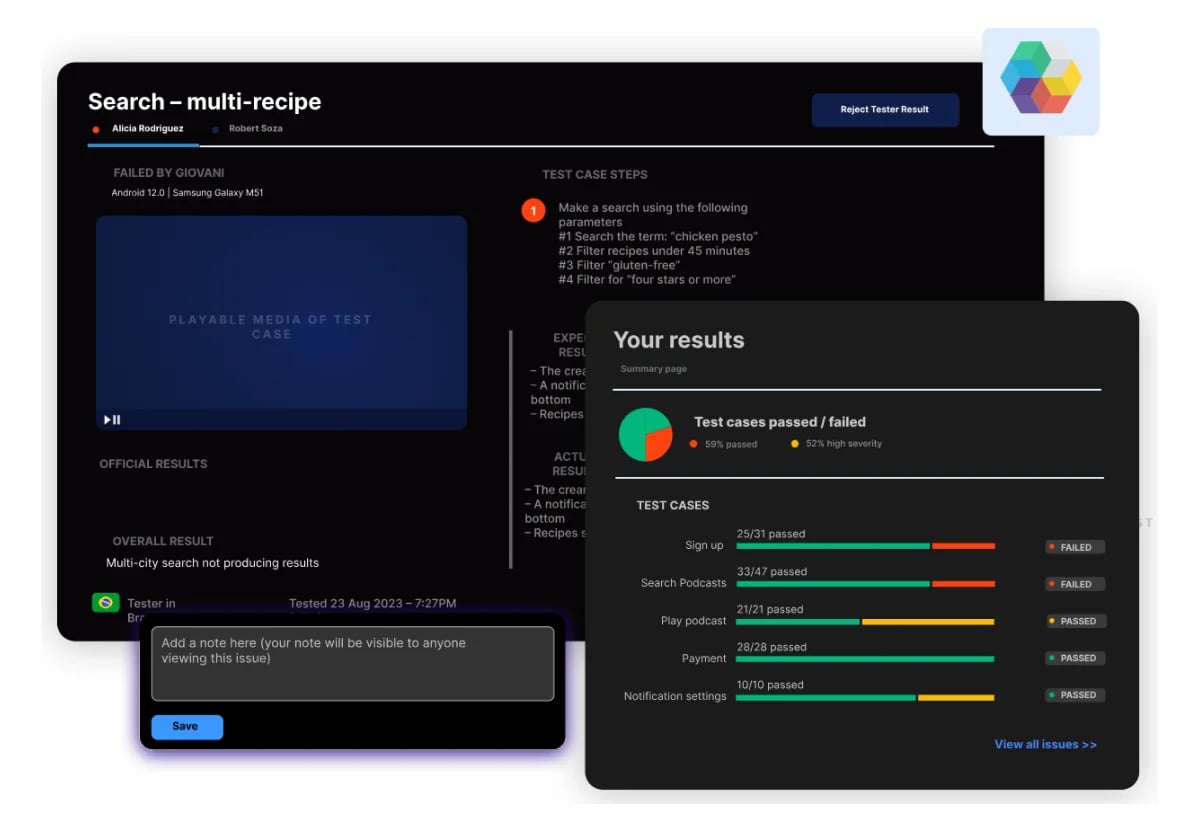A guide to outsourced software testing
The success of any software, be it desktop or mobile apps, relies on its User Interface (UI), Application Programming Interface (API), security, and performance under various conditions—all of which demand thorough testing. You have two choices: in-house testing or outsourcing to a third party. But why outsource? Well, it's becoming more important than ever to outsource this element of software development to maintain your team's productivity and performance.
In this blog post, we'll explore why software testing outsourcing is widespread in the IT industry, the pros and cons, and the best practices to follow.
What is outsourced software testing?
Software testing outsourcing refers to the practice where a company delegates the testing of an application or other piece of software to an independent test specialist, testing firm, or third-party entity. The company responsible for development will not be involved in the testing, and the software testing party will not be involved in other aspects of software development.

Pros of outsourcing software testing
1. Budget-friendly option
While outsourcing software testing might seem like an unnecessary additional expense, it can actually save you time and money in the long run. For example, your development team has just spent weeks creating software. However, they may lack expertise in QA testing, which means they will need extra time and resources to learn and execute it.
Thus, the cost savings will manifest in several ways:
- Human resources: You save on the costs of employing a skilled testing team.
- Project time: Experienced teams can accomplish more in a shorter timeframe.
- Data and hardware: There's no need to invest in the data or hardware required for quality testing.
2. Improved efficiency
Even compared to automated testing, outsourcing often offers superior testing methodologies and higher quality assurance. Though advanced, automated tools can overlook certain flaws detectable by human testers.
Let's say you're developing an integration for your mobile app. Your in-house QA engineers lack expertise in specific API testing procedures, resulting in inefficient workflows and subpar test plans. Outsourcing to a specialized team ensures proficient mobile and swift regression testing after each modification.
3. Test variety
One of the most significant advantages of outsourcing software testing is the variety of tests companies can efficiently perform on your new software.
For example:
- Localization testing ensures that your product will work well in global markets.
- Performance testing checks that your application performs under all testable circumstances, testing your software to its breaking point.
- Security testing to ensure your software has the best protection against hackers and other types of data loss.
- Functional testing enables a high-quality user experience and functions under pressure. It also takes your software through various test cases to ensure your app performs under normal and extreme circumstances.
- Exploratory testing allows the testing team to perform any necessary test to uncover potential bugs.
Cons of outsourcing software testing
1. Security concerns
Your top priority should always be safeguarding the security of customer and company data. Given that your software testing services often require access to sensitive customer and company information during testing, ensuring security from the moment the data is transferred until it is returned to you is imperative.
At Global App Testing, we meet the highest worldwide security standards. We provide:
- Data hosting and encryption
- Single sign-on and authentication
- Web application and network firewalls
- Disaster recovery and business continuity

2. Quality
The next problem is that it's hard to control the quality of testing of your outsourced services. Imagine you have outsourced your QA software to a company. The service pricing was suspiciously low, but your CEO wanted to push through product testing without making too much of a financial investment. After your rollout, your QA team found the software was buggy and had multiple compatibility issues. How to overcome it?
Outsource to companies with extensive experience and knowledge that have completed numerous projects. This gives them a deep understanding of software processes, frameworks, ROI considerations, and best practices.
3. Working across borders
When you work internally, you'll almost always carry out onshore testing. However, with outsourcing companies, your test engineers might be located across the globe. Not only can this get tricky with different data privacy and protection laws, but different countries also have different standards for software QA. You may also find that working through different time zones causes communication lags.
However, having the option of choosing experts from around the world can be very beneficial. You can build a team that can communicate effectively from wherever they're located and ensure your product meets the standards of a global market.
If you're a company out of the US, you may want to look for a company that can provide onshore services. In contrast, if there are particular data security features you need to do business in Europe, you may want your application testing to be executed by someone with expertise in GDPR compliance.
4 reasons to outsource your software testing
Now that you know the pros and cons of outsourcing, we'll go over some of the reasons you should outsource. From specialization to fresh perspectives, you need to switch to outsourced testing in your DevOps for many reasons.
1. Your internal team lacks the skills and resources
Your team can't be experts in everything. Especially for startups, it may be helpful to tap into the skills and resources of experienced QA testing services. The chosen outsourcing service provider will provide you with a team of experts to ensure that your software experiences a smooth launch.
2. You need to hit a tight deadline
Imagine your DevOps team has been working hard on a new, small business CRM application for six weeks. They're approaching the testing phase, and you want to release the app as quickly as possible. However, your team is burnt out and lacks the skills and resources to test rapidly. You could postpone the launch, but you have investors who are expecting the application soon.
To meet a looming deadline, you decide to use the services of an outsourced QA testing team. Their expertise and efficient workflows enable them to provide high-quality testing within a short time frame without sacrificing quality.
3. You’ve hit a wall and need an outsider's perspective
When you work on the same project for weeks, you can get too close to it to see its flaws. You know how it's supposed to work and how users are supposed to interact with it. One of the best features of outsourcing is to get a fresh pair of eyes.
The testing team was not involved in the development process, allowing them to recognize functionality and usability gaps. They also account for user behavior's unpredictability to see if the app may experience any bugs.
4. It’s a short-term project
As previously mentioned, outsourcing your QA needs can help you save money on the equipment and expertise required for software testing. This can be particularly cost-effective for short-term projects, where it may not be necessary to invest in building a dedicated QA team or infrastructure.
6 Best practices for outsourced software testing
When outsourcing, you want to ensure that your service provider implements best practices, including the latest testing technology and agile methodologies.
However, many independent contractors and organizations provide this service. One key factor to consider is security and privacy, especially when dealing with applications that handle sensitive user data, such as location-tracking apps.
For instance, businesses working on GPS-based services, like family tracker solutions, must ensure that their outsourced testing partner adheres to strict data protection regulations and industry standards. So, how do you choose?
1. Check the credibility of your outsourced team
ust as you wouldn't randomly select someone from Craigslist to handle your accounting, you must be discerning when choosing a company for software testing.
Ensure that the individual or company you're considering is reputable and credible:
- Request references if necessary and examine their track record on previous projects to gauge the quality of their service and the outcomes they've achieved.
- Verify whether they possess the expertise necessary for your specific project. A dependable testing service typically has comprehensive test documentation and readily provides prospective clients with test artifact templates.
2. Understand their resources and limitations
Even if an outsourcing testing company has an excellent reputation, it will always have limitations. Consider what you need in terms of testing before you partner with an external team. What testing tools do you prefer to use? What tools do they have for automation and manual testing?
You wouldn't expect a new QA testing service that might not have all the latest tools to complete a complex job that requires a wide range of automated and manual testing. Understanding all the resources at their disposal and their limitations will help you choose the best outsourcing service for your new software.
3. Seek out for specialized niches
Choose software testing services with industry-specific expertise to ensure your app's success. Industries vary in risks, timelines, and technologies, so select a company familiar with your sector's guidelines and compliance standards. For example, if developing a healthcare app, prioritize security and choose a team experienced with HIPAA compliance.
4. Look for transparent and clear communication
The most reliable companies prioritize transparency and effective communication throughout their interactions with you. When granting access to your data, it's essential to feel confident in their handling of sensitive information. A communicative team provides peace of mind by informing you about testing progress, especially when facing tight deadlines.
For instance, we offer real-time results at Global App Testing, giving you control over the testing process and access to raw data for enhanced communication with your team. Working within an open and communicative environment fosters better solutions and ensures thorough testing alongside your developers.

5. Set strong KPIs before outsourcing
A software testing company's effectiveness hinges on its ability to establish measurable and achievable goals. Key Performance Indicators (KPIs) serve as metrics to gauge the efficiency and effectiveness of the testing process.
Several KPIs are typically measured for software testing, including:
- Active defects: This KPI tracks the number of defects that are currently new, open, or fixed and awaiting re-testing. Establish acceptable defect levels based on past projects and industry standards.
- Automated tests: Decide on the percentage of tests to automate, starting with a suggested threshold of 20% and adjusting as experience grows and best practices emerge.
- Tests executed: This velocity KPI monitors the various tests completed, including manual and automated ones.
6. Monitor, evaluate, and give feedback
The last step is to continuously oversee and assess the testing process and outcomes to ensure they align with your objectives and standards. Use metrics and reports to monitor the progress, performance, and quality of testing projects.
Note: Don't forget to offer constructive and timely feedback to your outsourcing service provider to enhance their testing services and solutions.
Conclusion
When outsourcing testing, seek those who can offer insights based on industry developments, share their expertise, and suggest novel ideas, innovative strategies, and diverse perspectives. A company that is capable of directing your efforts toward the most relevant areas, technologies, and trends is more likely to evolve into a long-term strategic partner.
How can Global App Testing help?
- Diverse environments: Test across various devices, operating systems, and networks, replicating real user conditions accurately.
- Broad coverage: Simultaneously test different application aspects such as functionality, usability, and localization.
- Cost efficiency: Outsource with GAT for more economical testing solutions, reducing recruitment, training, and infrastructure expenses.
- Immediate feedback: Real-time analytics aid in swift issue resolution, accelerating time-to-market.
- Flexibility and scalability: Adapt to fluctuating testing demands and multiple project management scenarios.
- Versatile testing support: Accommodate various test types, including exploratory, regression, and performance testing.
- Global insight: Access insights from a worldwide tester base of 90,000+, offering critical feedback for globally relevant applications.
Ready to deliver high-quality software products effectively?
Sign up now and schedule a call with our specialist today!
We can help you outsource and drive software testing aligned with your business goals
Keep learning
Android app penetration testing - A detailed guide
The only functional testing checklist you need
11 Mobile testing trends you need to know about

